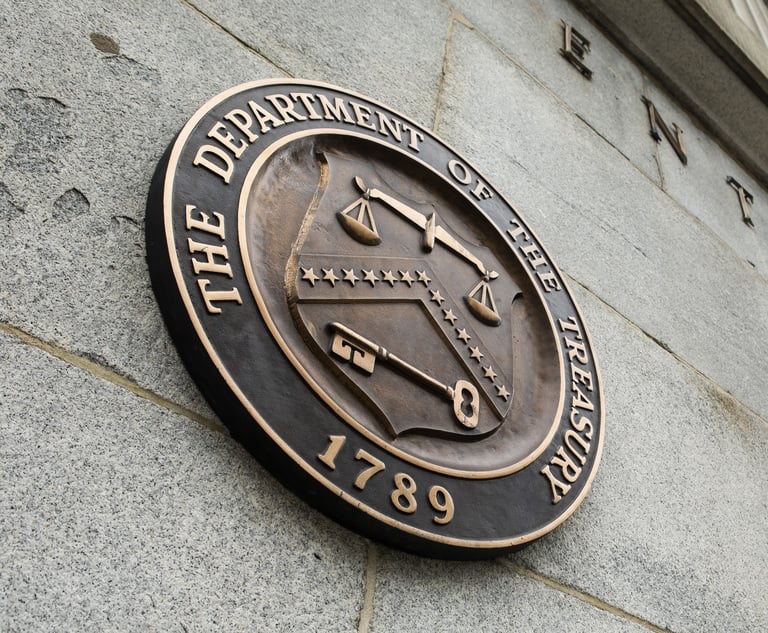Fla. Legislature Reduces Sales Tax Rate on Commercial Leases, Passes on Taxing Internet Sales
The tax bill signed into law by Florida Gov. Ronald DeSantis includes a slight reduction on the sales tax rate for commercial leases, but the bill is more notable for what it did not include—a law that would have required online retailers and marketplace sellers to collect tax on sales to Florida residents, even if the seller does not have a physical presence in Florida.
July 08, 2019 at 10:08 AM
6 minute read
 Marvin Kirsner, Greenberg Traurig shareholder
Marvin Kirsner, Greenberg Traurig shareholder
The tax bill signed into law by Florida Gov. Ronald DeSantis includes a slight reduction on the sales tax rate for commercial leases, but the bill is more notable for what it did not include—a law that would have required online retailers and marketplace sellers to collect tax on sales to Florida residents, even if the seller does not have a physical presence in Florida.
Reduction in Commercial Lease Rate
Florida is one of only two states that impose sales tax on commercial leases (Arizona, which allows local governments to impose a similar tax, being the second; New York City imposes a commercial rent tax on leases in portions of Manhattan that operates in a similar manner). The reason for taxing the lease of real property is simple—since Florida does not have a personal income tax or impose its corporate tax on pass-through entities (like S corporations or LLCs), the state simply needs to widen the net of its sales tax to raise the revenue necessary to balance the budget.
Former Gov. Rick Scott had a goal to eliminate the sales tax on leases, but budget constraints only allowed two small reductions in the state level tax rate during his administration—from 6% to 5.8%, effective January 2017, and then from 5.8% to 5.7%, effective January 2018. This year, the legislature could find only enough room in the budget to cut the lease tax rate to 5.5%, effective in January 2020, continuing to chip away at the tax in small amounts.
There are several important things to remember about this most recent rate reduction, as was the case for the prior rate reductions. First, the reduction only applies to the state level tax—the local county option taxes are still in full effect. For example, with the local county option taxes, the combined state and local tax rate for commercial leases in Miami-Dade, Broward, and Palm Beach counties effective January 2020 will be 6.5% because they each impose a 1% local option tax. Furthermore, this reduced rate does not apply to short-term residential property leases (leases of six months or less), which are still taxed at a state level rate of 6%, plus local option sales tax, plus local tourist development tax—which could result in a total short-term residential rental tax as high as 14% in some areas.
Tax on Internet Sales
Last year, the U.S. Supreme Court decided that an online seller does not need to have a physical presence in a state in order to be required to collect the state's sales tax, setting aside a 50-year precedent. As a result, states are now able to require internet sellers to collect tax on sales into the state. A total of 40 states have passed laws or regulations requiring internet sellers to collect sales tax, so long as the seller has reached a certain threshold of sales into the state—typically $100,000 in annual sales to customers in the state. Such a bill to require sales tax collection was introduced during the 2019 Florida legislative session, but it died when the session came to an end. As a result, Florida is one of only six states that impose a sales tax to take no action to require online retailers to collect its tax.
It is important to remember that even if an online seller is not obligated to collect the sales tax, the consumer is nevertheless obligated to pay the tax on a use tax return. Therefore, all purchases are taxable, the only question is whether the seller must collect the tax or the consumer must pay the tax directly to the Department of Revenue. Such a tax collection requirement is not a tax increase; however, it is likely perceived as one, at least politically.
Such sales tax collection laws can be burdensome for small- to medium-sized businesses, but because Florida administers the tax on the state level, including the local option tax portion of the tax, an online seller would only be required to file a single return, where some states require local returns to be filed with the local government units. In addition, since the tax is administered at the state level, there would only be a single state level audit. A Florida tax collection requirement would be somewhat friendlier to smaller businesses than many other states, which permit local government units to conduct their own audits.
Furthermore, the compliance burden could be eased for some small businesses by allowing a sales threshold higher than the $100,000 annual sales which has become the standard in most states to require tax collection. The South Dakota law that was upheld by the U.S. Supreme Court provides a $100,000 sales threshold, but South Dakota's population is less than 900,000—if Florida used the same sales-to-population proportion to determine that tax compliance trigger, this would translate to a threshold $2.3 million in Florida sales, an amount that would free many small businesses from the compliance burden.
There is also the possibility that Congress might take action and pass federal legislation that sets sales thresholds and eases compliance burdens on a national basis. When the Supreme Court last revisited the issue of sales tax collection on remote sales, the court said that this should be left to Congress, but Congress failed to act, eventually forcing the Supreme Court to make its decision last year. But the Supreme Court cannot legislate, it can only make broad policy, which does not set any bright line criteria on what states can require as far as a tax compliance burden. Perhaps Congress will now hear the calls of small businesses struggling to comply with the sales tax rules of 45 states plus the District of Columbia and pass uniform legislation that would simplify the compliance burden for businesses, but also allow states to collect sales tax revenue from online retailers.
Marvin A. Kirsner, a shareholder with Greenberg Traurig in its Boca Raton office, focuses his practice on corporate, transactional and industry-specific tax issues. He serves as co-chair of the firm's state and local tax (SALT) practice.
This content has been archived. It is available through our partners, LexisNexis® and Bloomberg Law.
To view this content, please continue to their sites.
Not a Lexis Subscriber?
Subscribe Now
Not a Bloomberg Law Subscriber?
Subscribe Now
NOT FOR REPRINT
© 2025 ALM Global, LLC, All Rights Reserved. Request academic re-use from www.copyright.com. All other uses, submit a request to [email protected]. For more information visit Asset & Logo Licensing.
You Might Like
View All

Don’t Forget the Owner’s Manual: A Guide to Proving Liability Through Manufacturers’ Warnings and Instructions
5 minute read

Trending Stories
- 1Who Are the Judges Assigned to Challenges to Trump’s Birthright Citizenship Order?
- 2Litigators of the Week: A Directed Verdict Win for Cisco in a West Texas Patent Case
- 3Litigator of the Week Runners-Up and Shout-Outs
- 4Womble Bond Becomes First Firm in UK to Roll Out AI Tool Firmwide
- 5Will a Market Dominated by Small- to Mid-Cap Deals Give Rise to a Dark Horse US Firm in China?
Who Got The Work
J. Brugh Lower of Gibbons has entered an appearance for industrial equipment supplier Devco Corporation in a pending trademark infringement lawsuit. The suit, accusing the defendant of selling knock-off Graco products, was filed Dec. 18 in New Jersey District Court by Rivkin Radler on behalf of Graco Inc. and Graco Minnesota. The case, assigned to U.S. District Judge Zahid N. Quraishi, is 3:24-cv-11294, Graco Inc. et al v. Devco Corporation.
Who Got The Work
Rebecca Maller-Stein and Kent A. Yalowitz of Arnold & Porter Kaye Scholer have entered their appearances for Hanaco Venture Capital and its executives, Lior Prosor and David Frankel, in a pending securities lawsuit. The action, filed on Dec. 24 in New York Southern District Court by Zell, Aron & Co. on behalf of Goldeneye Advisors, accuses the defendants of negligently and fraudulently managing the plaintiff's $1 million investment. The case, assigned to U.S. District Judge Vernon S. Broderick, is 1:24-cv-09918, Goldeneye Advisors, LLC v. Hanaco Venture Capital, Ltd. et al.
Who Got The Work
Attorneys from A&O Shearman has stepped in as defense counsel for Toronto-Dominion Bank and other defendants in a pending securities class action. The suit, filed Dec. 11 in New York Southern District Court by Bleichmar Fonti & Auld, accuses the defendants of concealing the bank's 'pervasive' deficiencies in regards to its compliance with the Bank Secrecy Act and the quality of its anti-money laundering controls. The case, assigned to U.S. District Judge Arun Subramanian, is 1:24-cv-09445, Gonzalez v. The Toronto-Dominion Bank et al.
Who Got The Work
Crown Castle International, a Pennsylvania company providing shared communications infrastructure, has turned to Luke D. Wolf of Gordon Rees Scully Mansukhani to fend off a pending breach-of-contract lawsuit. The court action, filed Nov. 25 in Michigan Eastern District Court by Hooper Hathaway PC on behalf of The Town Residences LLC, accuses Crown Castle of failing to transfer approximately $30,000 in utility payments from T-Mobile in breach of a roof-top lease and assignment agreement. The case, assigned to U.S. District Judge Susan K. Declercq, is 2:24-cv-13131, The Town Residences LLC v. T-Mobile US, Inc. et al.
Who Got The Work
Wilfred P. Coronato and Daniel M. Schwartz of McCarter & English have stepped in as defense counsel to Electrolux Home Products Inc. in a pending product liability lawsuit. The court action, filed Nov. 26 in New York Eastern District Court by Poulos Lopiccolo PC and Nagel Rice LLP on behalf of David Stern, alleges that the defendant's refrigerators’ drawers and shelving repeatedly break and fall apart within months after purchase. The case, assigned to U.S. District Judge Joan M. Azrack, is 2:24-cv-08204, Stern v. Electrolux Home Products, Inc.
Featured Firms
Law Offices of Gary Martin Hays & Associates, P.C.
(470) 294-1674
Law Offices of Mark E. Salomone
(857) 444-6468
Smith & Hassler
(713) 739-1250






